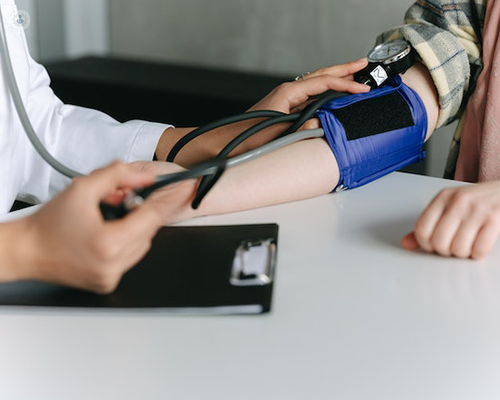Ask an expert: Why is it important to treat high blood pressure?
Written in association with:While high blood pressure, also known as hypertension, can be related to a number of conditions including diabetes, thyroid problems and sleep apnoea, it can also be caused by lifestyle factors, a family history or the normal ageing process. In this detailed article, revered consultant cardiologist Dr Charis Costopoulos shares his expert insight on the importance of effective diagnosis and treatment of high blood pressure.

What is hypertension?
Hypertension is defined as high blood pressure, which we would usually consider to be any reading of systolic blood pressure greater than 140/90mmHg (millimetres of mercury).
There are many ways of diagnosing high blood pressure and nowadays the most advisable approach uses a twenty-four hour blood pressure monitor which allows you to check your blood pressure over the course of one day as you complete your everyday activities.
Personally, I do not advocate for the diagnosis of high blood pressure diagnosis to be made based purely on a single or handful of readings during a GP or cardiology clinic visit. This is because patients can sometimes be slightly anxious being in an environment which is not familiar to them and this can therefore give a reading that does not represent your actual blood pressure.
Why is it important to treat high blood pressure?
High blood pressure is a condition that can negatively affect your health without you being aware that you are suffering from it. We know that if you have high blood pressure for a number of years, this can negatively affect the heart by causing the heart muscle to thicken which makes it more difficult to relax. High blood pressure can also affect your kidneys and it is one of the most important risk factors when it comes to stroke.
In practising preventative medicine, it is important that you have your blood pressure assessed at least once a year. If there are any concerns that your blood pressure could be high, this should to be confirmed with a twenty-four hour blood pressure monitor and if the assessment shows that your blood pressure is high, then treatment must be considered.
What are the symptoms of hypertension?
High blood pressure is often described as a silent killer because most patients will have no symptoms. Nonetheless, high blood pressure will continue to have negative effects on your health which are subtle and you will likely not be aware of them until significant or irreversible damage has taken place. If your blood pressure is extremely high you may complain of headaches or blurred vision.
How is hypertension diagnosed?
Normally we are alerted about a patient having hypertension because they have visited their GP or they themselves have taken a few readings at home which show greater than expected blood pressure readings.
It is important, however, that when blood pressure is taken at this setting that the presence of high blood pressure is confirmed with a twenty-four hour blood pressure monitor and that is something that can be undertaken at your GP practice or by seeing your cardiologist. This entails having a blood pressure monitor cuff on your arm for twenty-four hours where we take a number of readings during the day and the night.
Those results are then analysed and if we find that your blood pressure is significantly high then we need to think about the reasons why that is the case and then consider treatment. High blood pressure in general can be defined in two categories: primary, also known as essential, hypertension and secondary hypertension.
Essential hypertension usually doesn’t have a single, specific cause but rather multifactorial causes, which can include your lifestyle, a family history as well as other medical conditions. In these cases, assuming that simple lifestyle measures cannot effectively reduce your blood pressure, additional treatment may be required in order to achieve this.
Secondary hypertension is far less common and is usually the result of other underlying factors. This could include problems with hormones, for example high levels of cortisol or catecholamines (like adrenaline), structural abnormalities with the arteries that connect to the kidneys, or problems from the big vessel coming from the heart known as the aorta.
What causes hypertension?
In more than ninety per cent of cases, hypertension is primary and doesn’t have a single identifying or specific cause. It can be something that develops with age, related to a positive family history, lifestyle factors and other medical conditions.
If you are diagnosed with hypertension, there are some important lifestyle changes you can make that will help to reduce your blood pressure. In essence, these modifications relate to leading a healthier lifestyle by reducing your salt intake, reducing your stress levels and exercising more amongst others.
Secondary causes of high blood pressure, which as I have mentioned is far less common, can include coarctation of the aorta, where there is narrowing in the aorta. This is something that you would typically be born with. Hypertension may also result from a narrowing of one of the arteries that supply the kidneys. Abnormalities with thyroid function and adrenal gland problems can also cause high blood pressure, as can diabetes, kidney problems and conditions like sleep apnoea.
How is hypertension treated?
The key thing about the treatment for hypertension is that we get high blood pressure under control. How we achieve this will depend on how high your blood pressure is and whether this is primary or secondary. If this is only marginally raised, simple lifestyle measures can have make a significant impact. These include:
- reducing salt intake in your diet
- stopping smoking
- improving the amount of physical activity that you do
- reducing your alcohol intake
- trying to lose weight if you are overweight
Although simple lifestyle changes can have some impact, in my experience, for patients with very elevated blood pressure, these tend not to reduce your blood pressure to a sufficiently acceptable level. Therefore, the next step in cases of primary hypertension is initiation of medical medication.
To determine which type of medication should be used, we consider your age and some routine blood tests which we perform. Commonly used, first line treatments for hypertension tend to be angiotensin receptor enzyme inhibitors, such as Ramipril and angiotensin receptor II blockers, such as Candesartan, which can be very effective in reducing blood pressure.
In order to get good blood pressure control, combination treatment is usually required which usually involves the introduction of at least two types of anti-hypertensive medication. These include calcium channel blockers as well as thiazide diuretics amongst others.
If you require medication to treat your hypertension, the details of your medication regime will be discussed in more detail with your cardiologist. Sometimes it can take a bit of time to get blood pressure under control as we introduce new tablets and work to achieve the optimal dose and regime that will work for you.
If you are concerned about high blood pressure and wish to schedule a consultation with Dr Costopoulos, you can do so by visiting his Top Doctors profile.


